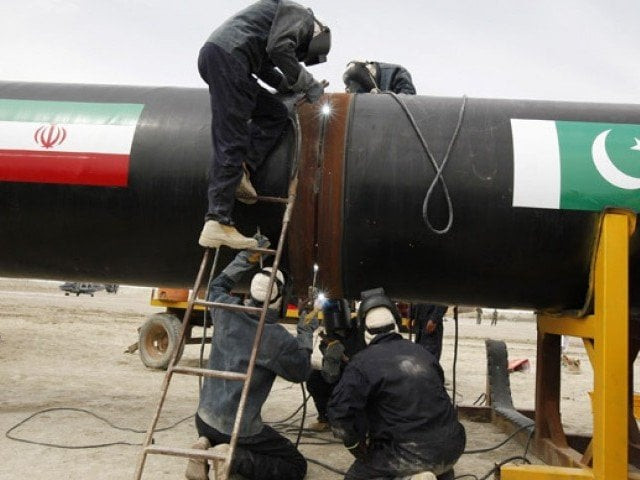Iran seeks extension in gas pipeline deal
Wants to keep project alive, avoid legal battle

As the threat of billions of dollars in penalty looms, Iran has asked Pakistan to extend their gas pipeline deal to keep the project alive in future.
Pakistan and Iran have not been able to execute the Iran-Pakistan (IP) gas pipeline project because of longstanding US sanctions against Tehran over the latter’s alleged nuclear programme.
Iran has already built years ago its part of the pipeline. Pakistan too was required to complete laying of the pipeline in December 2014 with planned start of gas delivery from January 1, 2015.
Also read Tehran rejects Islamabad’s notice on IP gas royalties
Following its failure to implement the project, Pakistan served a force majeure notice on Iran for suspending work on the pipeline, but the latter did not accept it.
The two sides have already signed an agreement to extend the IP pipeline deal for five years, which will expire in March 2024.
Sources told The Express Tribune that Iran conveyed to Pakistan during recent negotiations that it wanted to further extend the deal to keep the project alive.
According to the agreed terms, one extension in the bilateral agreement was allowed but the two countries could extend it for another term to keep the project alive, revealed sources.
Iran says it has completed its portion of the pipeline to Pakistan’s border whereas Pakistan has not yet commenced work.
Iranian Ambassador to Pakistan Dr Reza Amiri Moghaddam recently met Caretaker Federal Minister for Power and Petroleum Muhammad Ali where both sides discussed areas of mutual interest and promotion of brotherly relations.
According to sources, Pakistan’s energy minister assured the Iranian envoy that they would explore all options for the pipeline project.
Why IP project stalled
The IP pipeline has become a victim of geopolitics and a tussle between world powers operating in the region. In the beginning, India was part of the project but it pulled out owing to the influence of the United States, an arch rival of Iran.
Pakistan and Iran signed the gas sale-purchase agreement for the project in 2009 when Pakistan Peoples Party (PPP) was in power. It came despite opposition from different countries including Saudi Arabia, Qatar and the US.
During PPP’s tenure, an alternative mechanism was also established, under which it was decided to build a liquefied natural gas (LNG) pipeline in Gwadar, which would eventually be connected to the IP pipeline.
However, when the Pakistan Muslim League-Nawaz (PML-N), which is believed to have close ties with Saudi Arabia, formed its government, all progress on the IP project came to a halt.
In June 2017, when Saudi Arabia and Qatar were locked in a diplomatic row, Saudi Arabia built pressure on the then prime minister Nawaz Sharif, who also shelved the Gwadar LNG pipeline project.
US waiver
The United States has given a waiver to different countries on oil supply. When Joe Biden came to power, hopes grew in Pakistan that the IP project could be executed by seeking a waiver from Washington.
According to sources, the last Pakistan Democratic Movement (PDM) government, led by prime minister Shehbaz Sharif, approached the US, seeking the waiver. However, the US turned down the request.
On the other hand, the US had been providing assistance to Pakistan in purchasing LNG from Qatar and also extended legal support for a long-term deal between Pakistan and Qatar in 2015. Washington wanted Islamabad to replace IP gas with LNG.
Now, Pakistan is meeting its 24% energy needs via LNG imports. Other nations, however, keep a low LNG share, around 6%, in energy supplies as a stopgap arrangement.
Keeping that in view, a debate has emerged among different circles, who fear that LNG imports will kill the IP pipeline project.
At present, Pakistan is facing the threat of $18 billion in penalty if Tehran files claims in an international court. However, officials believe Iran will never go for arbitration and will agree on extending the deal’s time frame.
“Any legal battle between the two countries will mean the end of diplomatic ties, which Tehran will never want to see,” remarked an official.
Published in The Express Tribune, September 9th, 2023.
Like Business on Facebook, follow @TribuneBiz on Twitter to stay informed and join in the conversation.



















COMMENTS
Comments are moderated and generally will be posted if they are on-topic and not abusive.
For more information, please see our Comments FAQ